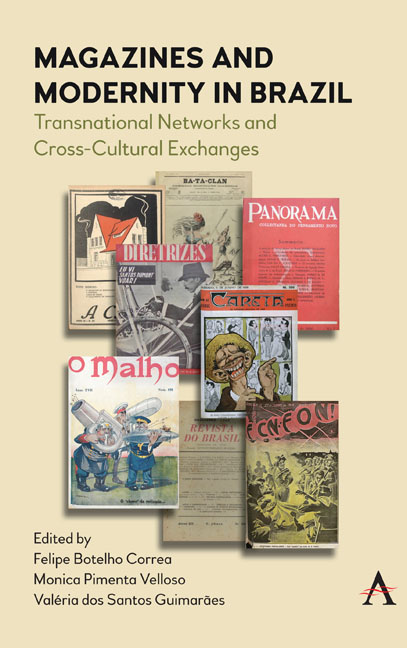Book contents
- Frontmatter
- Contents
- List of Figures
- List of Contributors
- Introduction
- Chapter 1 The French Periodical Print Culture In Brazil: A Survey of Catalogues and Mediators (1800–1945)
- Chapter 2 The Transnational Model of Popular Illustrated Magazines: Three Case Studies from Brazil (1900–20)
- Chapter 3 The Transnational Networks of the Modernist Periodical Print Culture: The Magazine Lumière in the Aftermath of WWI
- Chapter 4 Versions of Modernity in the Household Magazine A Casa (1923– 45)
- Chapter 5 Panorama Magazine and the Far-Right in Brazil (1936–37)
- Chapter 6 Against Nazi-Fascism in Brazil: The Case of the Magazine Diretrizes (1938–44)
- Chapter 7 Literary Inquiries and Disputes on Global Modernism: the Debate in Brazil During WWII
- Chapter 8 Modernity and Modernisms in the Magazine Sombra (1940–60)
- Index
Chapter 7 - Literary Inquiries and Disputes on Global Modernism: the Debate in Brazil During WWII
Published online by Cambridge University Press: 04 February 2022
- Frontmatter
- Contents
- List of Figures
- List of Contributors
- Introduction
- Chapter 1 The French Periodical Print Culture In Brazil: A Survey of Catalogues and Mediators (1800–1945)
- Chapter 2 The Transnational Model of Popular Illustrated Magazines: Three Case Studies from Brazil (1900–20)
- Chapter 3 The Transnational Networks of the Modernist Periodical Print Culture: The Magazine Lumière in the Aftermath of WWI
- Chapter 4 Versions of Modernity in the Household Magazine A Casa (1923– 45)
- Chapter 5 Panorama Magazine and the Far-Right in Brazil (1936–37)
- Chapter 6 Against Nazi-Fascism in Brazil: The Case of the Magazine Diretrizes (1938–44)
- Chapter 7 Literary Inquiries and Disputes on Global Modernism: the Debate in Brazil During WWII
- Chapter 8 Modernity and Modernisms in the Magazine Sombra (1940–60)
- Index
Summary
This chapter discusses the origins of the literary inquiries and interviews, which were used in many contexts since the nineteenth century to support political, sociological and journalistic discourses. The first part of the text explores the emergence of these practices of interviews and questionnaires, and their rapid transnational diffusion in a historical period marked by various uncertainties. In the second part of the chapter, I analyse a case study from Brazil connected to this transnational genre, focusing on the magazine Revista do Brasil during the period of World War II. It should be noted that in 1940, the Nazis seemed invincible, while in Brazil President Getúlio Vargas (1882– 1954) was completing ten years in power. Vargas took over as president of the republic in 1930 by means of a coup d’état and, in 1937, in the middle of the electoral campaign to choose who would replace him, he led a coup, remaining in office and establishing the Estado Novo. This was a dictatorial regime responsible for putting into practice a well-woven political and cultural project that brought the country closer to the authoritarian models governing various countries in Europe. Thus, internally and externally, these were difficult times and they urged intellectuals to engage with the political field and to put aside formal and avant-garde experiments that marked the preceding decades in different latitudes of the Western world.
It was at this moment that the Rio de Janeiro-based Revista do Brasil (1938– 43), on its third phase since its original issue was published in 1916, decided to conduct a survey among intellectuals to reassess the 1922 Week of Modern Art, which was considered as the founder of the modernist movement in Brazil. Like their counterparts in other countries, the Brazilian modernists also openly challenged the prevailing order in the literary and artistic world. In addition to examining the terms of the proposed survey and the strategy adopted for their implementation, I will analyse the profile of those who were invited to participate and their responses. This material reveals not only the predominant climate in the literary environment at the time, but also the disputes and tensions that emerged from it.
- Type
- Chapter
- Information
- Magazines and Modernity in BrazilTransnational Networks and Cross-Cultural Exchanges, pp. 129 - 154Publisher: Anthem PressPrint publication year: 2020



